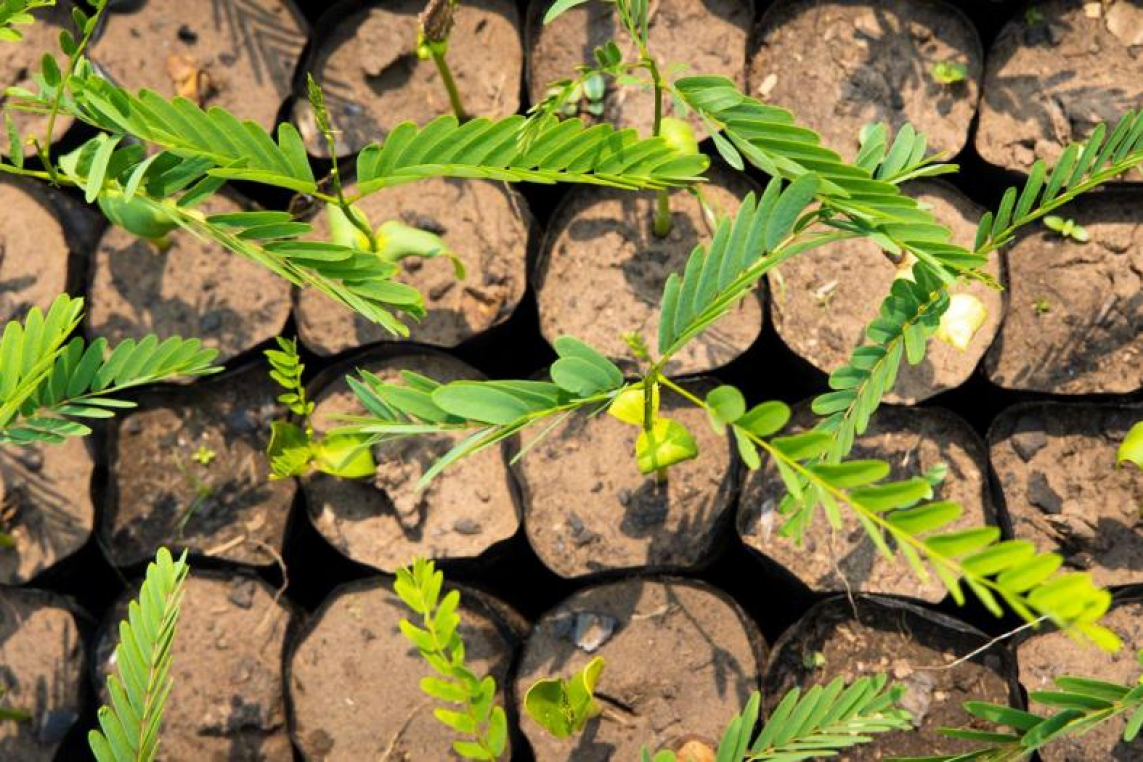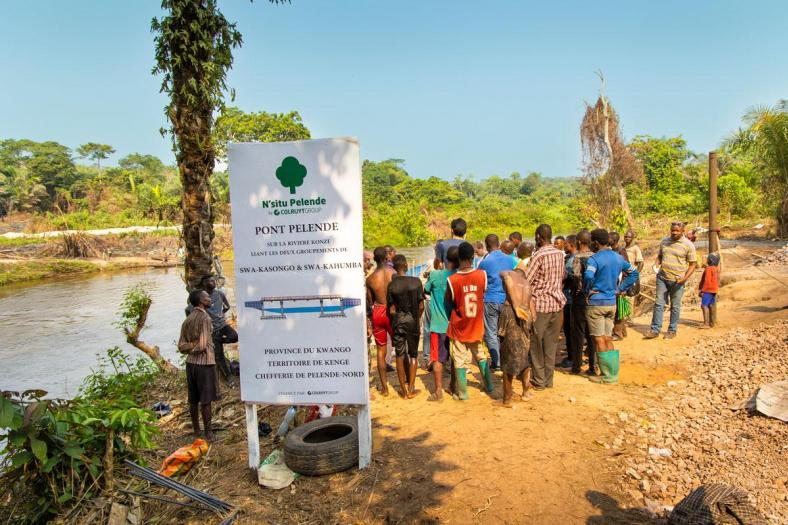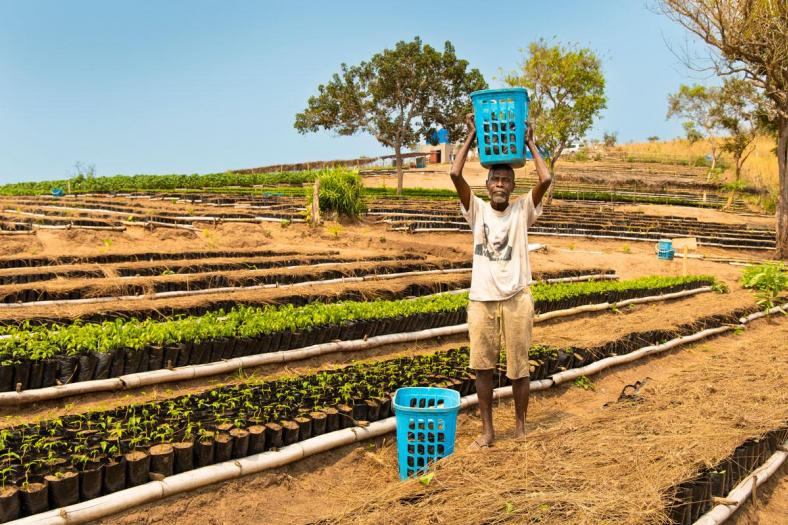John Vandaele bericht over de sociale, ecologische, economische en bestuurlijke aspecten van globalisering.
Why a Belgian supermarket chain is planting 12 million trees in Congo

Colruyt has since planted four million trees on 3,000 hectares in Congo.
© Bart Lasuy
A major supermarket chain that wants to plant 12 million trees in Congo is to be climate-neutral: how does that work? And is Colruyt Group effectively on track to realise those ambitious climate plans by 2030? MO* journalist John Vandaele went on site and saw opportunities, but also challenges. “We hope that the Congolese population will benefit as much as possible from our project,” says the head of the project.
Translation of this article is provided by Kompreno, using a combination of machine translation and human correction. More articles from MO* are included in kompreno‘s curation of the finest analysis, opinion & reporting — from all across Europe, translated into your language. Original source
Climate change is changing our world, and hence our economy. We also notice this in companies’ policies. For instance, the climate crisis is taking Colruyt Group to the Democratic Republic of Congo. Not so much because its own brand products are in the Kinshasa department stores, but mainly because the big Belgian supermarket chain wants to plant 10,000 hectares of forest there.
The choice of Congo may sound somewhat surprising. Yet Colruyt Group has historical ties with the Central African country. In 1928, Franz Colruyt Group started a wholesaler of colonial goods in Lembeek near Halle. However, it is not that past, but the present and the future that bring the retailer back to Africa.
‘By 2030, we want to be carbon neutral. Our annual emissions will then be 40% lower. We want to offset the remaining emissions. That does not prevent us from continuing our efforts to emit less. Avoiding emissions is always better than offsetting,’ says Jeroen Theys, who heads Colruyt Group’s Congo project.
‘We want to be at the wheel ourselves as much as possible.’
‘We have investigated how best to approach this offsetting, and forestry is still an interesting method. If we want to offset all our 2030 emissions, we need 12 million trees on 10,000 hectares. You can’t find such an area — almost 2.5 times the Sonian Forest — in Belgium, and it is even hard to find it in the rest of the world. In Congo, however, that land is available. That’s why we came here.’
To reduce their emissions, a lot of companies buy so-called carbon credits. These are realised through projects that reduce emissions or absorb CO2. It could be achieved through the distribution of improved ovens, as well as the production of renewable energy or the implementation of reforestation initiatives.
Colruyt Group deliberately chose a different path. In 2021, the supermarket chain started a forest project near the town of Kenge, a four-hour drive from Kinshasa. This does not mean it is on its trial run: it also has its own wind power department and is innovating with hydrogen.
That doesn’t mean the Group has figured out all by itself how to plant hundreds of hectares of forest in Congo. Belgian NGO Faja Lobi planted 1,100 of the 3,000 hectares covered in its first year of operation. 1500 hectares were then planted by Congolese NGO CADIM, and Colruyt Group did the remaining 400 hectares in-house. ‘We want to be at the wheel ourselves as much as possible,’ Theys stresses.
Agreement with the mfumu
The area in which Colruyt Group operates largely consists of degraded savannah. After negotiations with the mfumu Louis Makanuba Mitsunga — the local king, so to speak — the retailer was able to take 4 000 hectares under concession for 25 years, with an option on an additional 6 000 hectares.
The price per hectare is reportedly $25, a very competitive price given its proximity to Kinshasa. ‘The price per hectare is low because during the negotiations, a specification was established with the population. In it, they were able to put forward their needs,’ explains Theys.
That includes Colruyt Group financing the construction of medical posts and a bridge over a river that divides the area. The company is also helping to strengthen education, especially through the construction of schools. ‘We are still researching the best way to build the schools and medical posts, because the planning of education and health care services is normally the responsibility of the state.’
The cost of the project is spread over a down payment of the concession price, as well as social costs in the form of project specifications, the employment of hundreds of local residents, in addition to investments in communication and agricultural activities. Colruyt Group pays its hundreds of day labourers three dollars a day. It also employs three Congolese staff on a more permanent basis.

Jeroen Theys: ‘We work with fast-growing acacias but also with native species.’
© Bart Lasuy
Quick result
Colruyt Group has already got off to a flying start. Meanwhile, with the help of the two NGOs, CADIM and Faja Lobi, the company managed to plant four million trees on 3,000 hectares. ‘We started tree nurseries in August 2021, planting out shoots in December 2021,’ says Theys. ‘We are working with fast-growing acacias, but also native species.’
We drive through the landscape of gently rolling and expansive grasslands. Theys poses among the acacias during our visit. In less than a year, some of the trees are already taller than him. ‘Initially, we wanted to run the project from Kenge. But gradually we felt we could manage our achievements better if we were closer to it.’
‘I am convinced that our customers will appreciate the fact that we will be carbon-neutral in eight years’ time.’
So here, in the middle of the forest, a base was built: a settlement with living quarters, sleeping quarters and sheds on a hilltop that towers over the surrounding area and also has telephone connection.
We visit the bridge over the river — one of the requirements in the specifications. The works are not quite going according to plan. Time and again, water flows into the place where the foot of the bridge is supposed to be. It looks like an excavator will be needed to get the job done — and thus a little less human labour.
‘That’s unfortunate,’ Theys thinks, ‘because we want to employ as many people as possible. We hope that the Congolese people will benefit as much as possible from this project.’ The contractor regrets that he is stuck with a competitive price — $300,000 — and that additional tools will drive up the cost.
Precisely how much Colruyt Group will invest in the overall project Theys would not reveal during our visit. He did let slip that ‘this will cost us a lot more than 10 million euros.’ Later, the figure of 65 million euros is mentioned. ‘The estimated cost over 25 years,’ Theys clarifies.
‘We are now investing eight million euros in transport equipment, buildings and in the reforestation works themselves. On top of that there will be the operating costs, and all the other activities we have planned with the population in the coming years. Anyway, it is a lot of money; you have to sell a lot of tomatoes for that. Nevertheless, I am convinced that our customers will appreciate the fact that we will be carbon-neutral in eight years’ time.’

Jeroen Theys: ‘We want to employ as many people as possible.’
© Bart Lasuy
Trial and error
With as many as 1,100 hectares in one year, Colruyt Group and Faja Lobi achieved great results. Yet the two have since put a stop to the cooperation. They established that they have different views on how to approach things.
‘It is in our DNA to do things ourselves and in that way want to learn as much as possible ourselves,’ says Theys. ‘A consequence of that is that sometimes you make mistakes. That is inevitable, but you learn from that and you build knowledge. Now we know more than we did a year ago.’
As an example, he speaks about the transfer of Faja Lobi’s operating area to Colruyt Group. This involved a misunderstanding regarding 10 hectares of cassava planted among the trees. The day labourers thought the food was meant for them, while the supermarket chain wanted to trade it itself. One night, the workers clandestinely removed some of the cassava from the field.
‘We hope our initiative will be inspiring for the local community, our employees, customers and suppliers.’
‘We have communicated poorly on that, we have to acknowledge that. But we nevertheless cannot allow that cassava to be stolen from the fields just like that. Therefore, a refund was agreed with the village chief: the day labourers concerned will give up two times five dollars of their monthly salary.’
The intention is not to make a profit from that cassava, Theys stresses. ‘But by trading it ourselves, we learn about the value chain and can build an economy for our workers that increases their income.’
‘We think it’s better that they don’t market the cassava on their own to the casual passing buyers. They can get gain more if we assist them to sell their produce directly in Kenge, or even Kinshasa.’ Whether villagers will organise themselves into a cooperative to this end is not yet clear.
Mfumu Louis is aware of the misunderstanding: ‘It is important that such confusion is addressed quickly. In any case, I believe that our farmers will be able to boost their income if they can offer their produce in larger markets. It has been agreed that we will strengthen the dynamics of the communities.’
‘Give us time to learn,’ adds Jef Colruyt, Colruyt Group CEO. ‘Thanks to our international export arm Colex and our experience with the Collibri Foundation, aimed at professional integration of vulnerable young people, we already have a lot of experience in Africa. But cross-cultural cooperation in the field, in a new activity like reforestation, is also a challenge for us, especially in a country like Congo.’
‘We strongly believe in the project and will continue to professionalise over the next few years. We will build appropriate cooperation models, learn from our mistakes and move forward again. We hope our initiative will be inspiring for the local community, our employees, customers and suppliers.’

Colruyt creates forest where it had disappeared and provides jobs and income in a region where it is very welcome.
© Bart Lasuy
Not being the cheapest
Day labourers from Kingungu who work for Colruyt Group tell me via Whatsapp that they regret that they are often unable to work during the planting season when the rain fails to arrive — even though, according to them, there is ample maintenance work. Because of this weather uncertainty, their monthly wages regularly drop from $80 to $50. They hope the Belgian supermarket chain can provide a more stable income.
Jeroen Theys stresses that the work is seasonal. ‘There is obviously more work in the planting season than in the drying season. Apart from that, we grant people as much work as possible, but of course it has to be available. Moreover, these people are day labourers, who by law can do the same job for a maximum of 22 days. So there has to be some rotation anyway.’
Herman Noppen and Antoine Geerinckx of South Pole, the world’s largest climate consultant to companies, have had discussions with Colruyt Group about the project. They questioned the approach. ‘Always wanting to be the cheapest is not necessarily the best approach for reforestation projects,’ raises Geerinckx. ‘Certainly not in a poor country like Congo, where you want to create social support and sustainability. You also have to consider the additional benefits for people and nature.’
‘Those who work for the project see their income go up, can send their children to school, improve their homes.’
Theys disagrees with that criticism. ‘We did consult with them once,’ he says. ‘To extend the principle of lowest price to such a project is absurd, incorrect and harmful. We are investing a lot of money, effort and energy to execute this beautiful project in the best possible way. With respect for the people on the ground.’
Mfumu Louis points out that whoever organises the work should also determine how it is completed. ‘After all the weeds are gone, there is simply not much to do now,’ he says. Still, the project is living up to his expectations, he says. ‘Besides the fee for the concession of the land, there are very attractive things in the project specifications. We are now implementing these step by step: manioc mills, schools, health centres — you name it.’
Mfumu Louis feels he is being taken seriously and believes the project will move his community forward. ‘Those who work for the project see their income go up, can send their children to school, improve their homes. But even those who don’t work for it will benefit. Because they can sell more food, for example, to the people working for the project.’
This is how the circle expands, according to mfumu Louis. ‘The education authorities have told me that in the villages concerned, more students are already going to school than before. The reason is that people are earning more and thus can pay school fees more easily. So, the positive effects are measurable.’
Colruyt Group is creating a forest where it had once disappeared, which is positive. The project creates jobs and income in a region where that is very welcome. But what applies to any forestry project in Congo certainly also applies to that of the Belgian supermarket chain: it will have to find support among the population. Because only by giving the Congolese a long-term economic future can you save the forests from being cleared.
 This reportage was produced with the support of the Pascal Decroos Fund for Special Journalism.
This reportage was produced with the support of the Pascal Decroos Fund for Special Journalism.
Maak MO* mee mogelijk.
Word proMO* net als 2793 andere lezers en maak MO* mee mogelijk. Zo blijven al onze verhalen gratis online beschikbaar voor iédereen.
Meer verhalen
-
Report
-
Report
-
Report
-
Interview
-
Analysis
-
Report










 Oxfam België
Oxfam België Handicap International
Handicap International